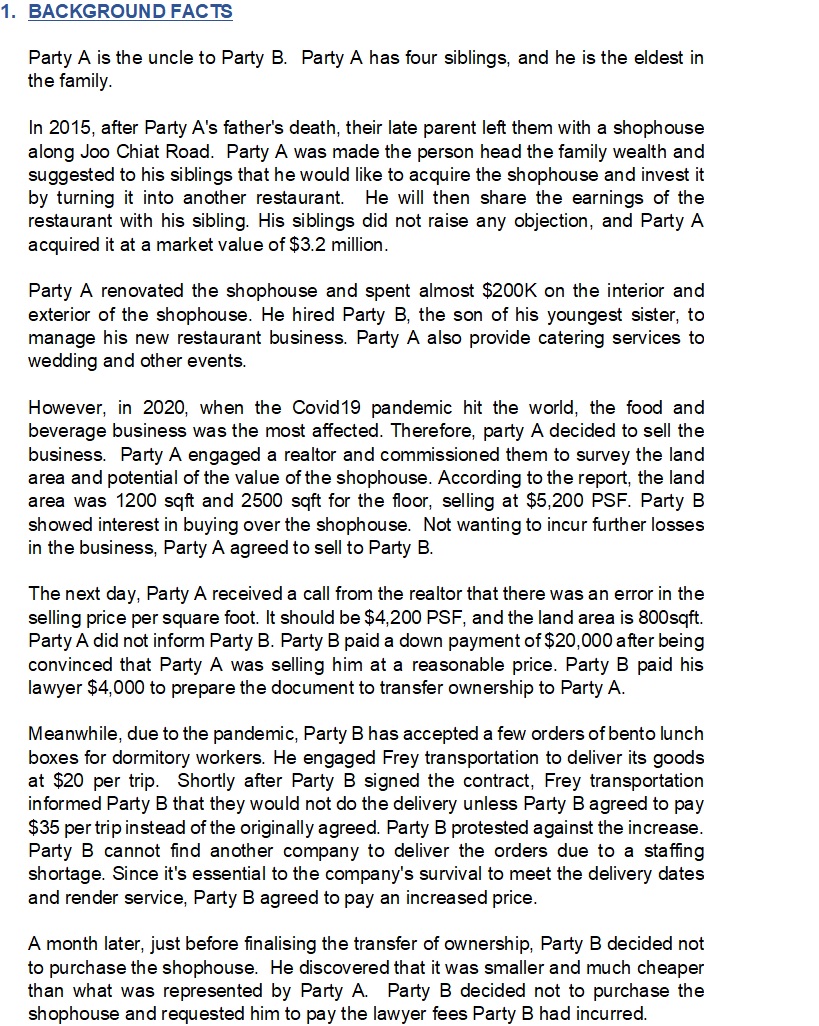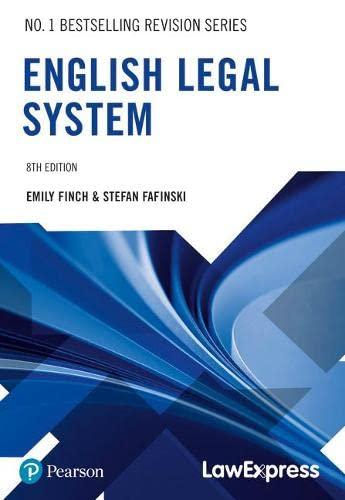I have prepared the case study. Please help with the questions below;-
Questions
Application and highlights of applicable law
- Comprehensive and accurate application of relevant legal principles. Must reference to the supporting facts drawn from the case study. Application is accurate. Explain the law relating to misrepresentation (the definition, the types of misrepresentation, the remedies etc.) AND also the law relating to duress (the definition, the types of duress, the remedies etc.).
Misrepresentation
a) Definition
b) Type of Misrepresentation
c) Remedies
Duress
d) Definition
e) Type of Duress
f) Remedies
After the explanation of the law, the law should be applied to the case study. If the chosen topic is misrepresentation, explain how Party A misrepresented a particular fact to Party B, what was the type of misrepresentation and the impact of that misrepresentation on Party A's contract with Party B. and how Party B was in economic duress due to the circumstances given in the case study
2. Provide an appropriate conclusion on the facts and applicable laws stated in the case study. For example, explain how a court will decide that Party A has committed misrepresentation and if so, state the remedies available for the court to impose on Party A.
1. BACKGROUND FACTS Party A is the uncle to Party B. Party A has four siblings, and he is the eldest in the family. In 2015, after Party A's father's death, their late parent left them with a shophouse along Joo Ghiat Road. Party A was made the person head the family wealth and suggested to his siblings that he would like to acquire the shophouse and invest it by turning it into another restaurant. He will then share the earnings of the restaurant with his sibling. His siblings did not raise any objection, and Party A acquired it at a market value of$3.2 million. Party A renovated the shophouse and spent almost $200K on the interior and exterior of the shophouse. He hired Party B, the son of his youngest sister, to manage his new restaurant business. Party A also provide catering services to wedding and other events. However, in 2020, when the Covid'lQ pandemic hit the world, the food and beverage business wasthe most affected. Therefore, party A decided to sell the business. Party A engaged a realtor and commissioned them to survey the land area and potential of the value ofthe shophouse. According to the report, the land area was 1200 sqft and 2500 sqft for the oor, selling at $5,200 PSF. Party B showed interest in buying over the shophouse. Not wanting to incur further losses in the business, Party A agreed to sell to Party B. The next day, Party A received a call from the realtor that there was an error in the selling price per square foot. It should be $4,200 PSF, and the land area is 8005qft. Party A did not inform Party B. Party B paid a down payment of$20,000 alter being convinced that Party A was selling him at a reasonable price. Party B paid his lawyer $4,000 to prepare the document to transfer ownership to Party A. Meanwhile, due to the pandemic, Party B has accepted a few orders ofbento lunch boxes for dormitory workers. He engaged Frey transportation to deliver its goods at $20 per trip. Shortly after Party B signed the contract, Frey transportation informed Party B that they would not do the delivery unless Party B agreed to pay $35 pertrip instead ofthe originally agreed. Party B protested against the increase. Party B cannot nd another company to deliver the orders due to a stafng shortage. Since it's essential to the company's survival to meet the delivery dates and render service, Party B agreed to pay an increased price. A month later, just before nalising the transfer of ownership, Party B decided not to purchase the shophouse. He discovered that it was smaller and much cheaper than what was represented by Party A Party B decided not to purchase the shophouse and requested him to pay the lawyer fees Party B had incurred







